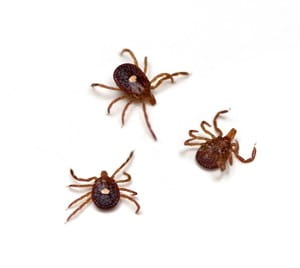
Ticks are arachnids, and fall in the same genetic lineage as spiders. However instead of benefiting homeowners by catching and eating mosquitos or flies, ticks can be a major irritant or even a dangerous backyard or home pest. Aside from a sometimes painful bite, ticks can transfer disease to pets and humans. Because they are ectoparasites, they feast on the blood of larger and small animals, presenting a perfect opportunity for a pathogen or virus to be spread.
Not only is it important to exercise caution when spending time outdoors during tick season, but there are a number of ways to modify your backyard to minimize the risk of a dangerous encounter.
According to the Centers for Disease Control and Prevention, there is a long list of tickborne ailments that pose a safety risk to humans. Many of these may be relegated to a specific species of tick or a certain region of the country, but regardless, underestimating just how dangerous these little bugs can be is never wise.
One of the most well-known and common diseases that ticks may spread is Lyme Disease. The CDC reported that this may lead to fever, fatigue and headache, as well as a visible skin rash at the site of a bite. Lyme Disease is especially dangerous because without medical intervention, it can spread to the rest of the body and affect the joints, nervous system and even heart.
The other diseases that can be harbored by ticks can also lead to serious symptoms. If you have a confirmed or suspected bite and are suffering from any adverse health conditions, it is wise to consult a doctor.
When hiking or camping, the best bet for reducing your risk of a tick bite is by being proactive. Wear long pants and sleeves, and apply a strong bug spray. Likewise, avoid long grasses or brush whenever possible. After every outdoor adventure, be sure to do a thorough tick-check in the shower. If you do find a bite, remove the entire animal using a pair of tweezers and save it on a piece of tape or put it in a pill vial to give to a doctor should you develop any symptoms.
While it may be impossible to eliminate the risk of ticks out in the wild, there are many ways homeowners can reduce the possibility of ticks taking up shop in the backyard. The Massachusetts government highlighted a number of tick prevention methods.
Invest in proper landscaping, because this reduces habitat for ticks to hide and breed. Long grass or brush piles may harbor these dangerous bugs. Damp, shady lawns are also great for ticks who need moisture and sun protection to survive.
Pest control management is also a critical step in reducing the number of ticks in the backyard. Mice, rats and other mammals may carry unwanted bugs onto your property. For that reason, taking positive steps that prevent small mammals from getting too comfortable in your yard can also bring about a reduction in the number of ticks.